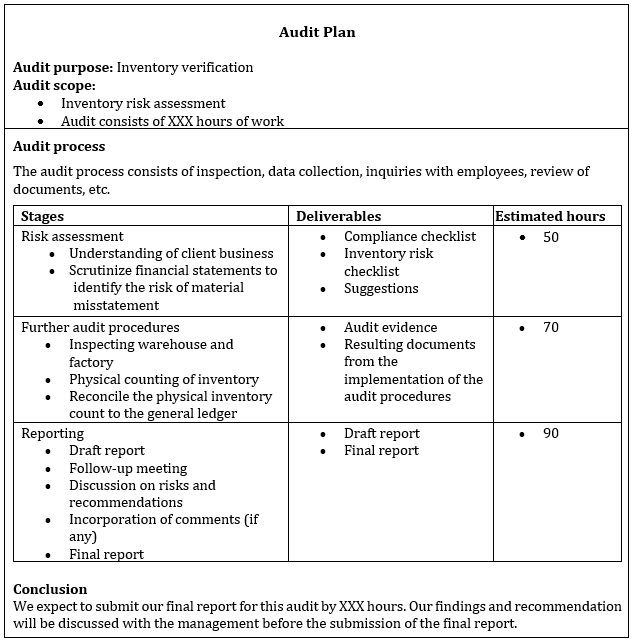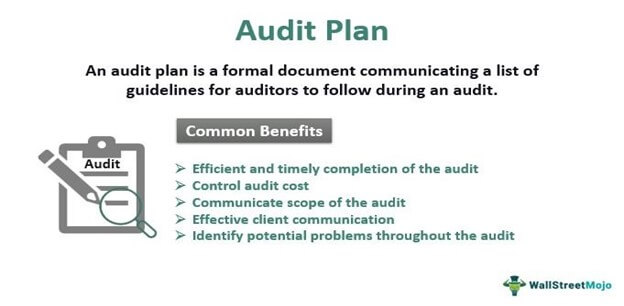A summary of discussions with the management team. Therefore the audit plan should explain how different documents will be indexed in the audit process.

Slideshare Audit Process Audit Procedures Audit Planning Auditing 9c232f2e Resumesample Resumefor Business Process Audit Internal Audit
Providing senior management with information about the quality of the internal audit activitys performance.

. The combined assessed level of inherent and control risk. Gaining knowledge of clients internal control system. Planning for auditing is the initial step in an audit.
The plan thus made should be documented properly for conveying it to the team and successful implementation of the plan. It includes overall strategy plan and any changes made in plan during audit along with reasons thereof. I would say the following are key components.
In addition to relevant regulatory compliance mandates objectives for audit programs should consider aspects such as management priorities business intentions system requirements business structure legal and contractual mandates the expectations of customers and other interested parties potential risk management vulnerabilities and any. Scheduling support for the external audit. Nature timing and extent of various risk assessment procedures.
A well drawn audit plan offers the following advantages. The auditor should plan the audit work so that the audit will be performed in an effective manner. An auditor shall prepare an audit plan considering the following.
In most cases an audit plan consists of the following phases. Planning documentation should include. Auditors experience with the entity and knowledge of the business.
It helps the auditor efficiently manage the audit by analyzing the prime focus areas proactive problem. Aidentify the characteristics of the engagement that define its scope. The nature and complexity of the audit engagement c.
The key areas to be included in the plan are. Planning fieldwork a follow-up meeting and a remedial audit. An effective efficient and timely audit needs audit planning.
Time budget for the various audit areas c. Establishing standards for employee performance. Determining the scope of the audit.
The auditor shall develop an audit plan that shall include a description of. It ensures that no important area is left out. Management responses should include their action plan for correction.
Track risk assessments annually and centrally. Determining the program of audit fixing up time schedules and nature and extent of audit procedures to be carried out. All important areas of management receive attention.
B Cost-benefit of gathering evidence. The auditor should consult with management and staff of the organization about current trading circumstances and any significant changes in the business carried on and the management of. In the preparation of an audit plan which of the following items is not essential.
Set of planned audit procedures d. In designing written audit programs an auditor should plan specific audit procedures to test. Audit plan includes the nature timing and extent of audit procedures that the audit team members need to perform in order to obtain sufficient and appropriate audit evidence and reduce the audit risk to an acceptably low level.
By tracking audit risk assessments and data in one place it allows your organization to start comparing risk over time and build trending reports on risk. It helps in identifying potential problems. The assessed level of control risk.
Conducts proper risks assessments including risks of error and fraud. The extent of planning will vary according to any of the following except. Assessment Evidence And Supervision.
The audit report and management responses will be reviewed and discussed. The audit plan should include a review of these changes and whether the client has complied. C An understanding of controls established.
Audit planning is a critical part of audit works and performing the correct audit plan could be the factors that lead to the success of audit engagement. It helps in the successful completion of the audit process. The planning phase is when external auditors meet with company management to determine which accounting processes will be audited and what the depth and breadth of the audit should be.
A Timing of audit procedures. This meeting is held with department management. A A review of material from prior audits.
The nature timing and extent of audit procedures Various other planned audit procedures need to apply in accordance with applicable Standard on Auditing SA Terms of engagement and statutory responsibilities. The audit plan should cover mainly the following. An approved audit plan for the internal audit activity is an essential part of A.
It provides right means to accomplish audit objectives. A draft audit report will be submitted to the management of the audited area for their review and responses to the recommendations. A The nature timing and extent of planned risk assessment procedures as determined under ISA 315.
The auditors will require different pieces of evidence to support their conclusions and judgments. B The preparation of a budget identifying the costs of resources needed. 07 The auditor should establish an overall audit strategy that sets the scopetimingand direction of theauditandthatguides thedevelopmentof theauditplan.
The audit plan should also cover the documentation needs and procedures during the process of audit. This can be valuable information to include in the annual audit report to executive management. Planning for the internal audit activity.
The audit program should contain the following except. 05 Planning the audit includes establishing the overall audit strategy for the engagement and developing an audit plan which includes in particular planned risk assessment procedures and planned responses to the risks of material misstatement. Gaining knowledge of the clients accounting system.
C Selected audit techniques. An audit plan refers to the design of an audit describing the overall audit strategy and guidelines to follow while performing the audit.

Planning An Audit The Audit Process Consists Of The Following Phases Audit Communication Activities Accounting Cycle

Audit Plan Meaning Process Example Sample Template

7 Audit Plan Template Samples How To Plan Financial Management Risk Analysis

0 Comments